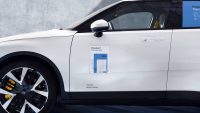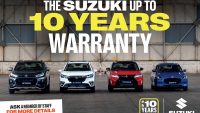Labour has announced today it will reinstate the 2030 ban on new petrol and diesel vehicles should it win the election on July 4.
The party added that it would be helping used car buyers by ‘standardising the information supplied on the condition of batteries’.
The commitment in its manifesto, announced today, claiming this would provide ‘certainty to manufacturers’.
The news was backed by industry figures, however SMMT chief executive Mike Hawes added that consumers ‘need carrots not sticks’ whatever the timeline is.
The move would reverse the decision of prime minister Rishi Sunak in September last year to delay the ban on the sale of new petrol and diesel cars and vans in the UK from 2030 to 2035.
Labour said it would ‘support the transition to electric vehicles’ by accelerating the roll out of chargepoints.
The Liberal Democrats have also included electric car and charging in their manifesto, and you can read what the three main parties have pledged for drivers below.
AA president Edmund King said: ‘The AA supported the original zero emission new car sales deadline of 2030 as ‘challenging but ambitious’.
‘Reintroducing the 2030 deadline would enable us to maintain momentum on the net zero transition and improve our chances of delivering the UK’s net zero ambition.
‘But drivers will need to be supported with the right incentives – and reassured that we’ve made significant progress on infrastructure – to make the shift possible.’
Auto Trader commercial director Ian Plummer said: ‘We would welcome the restoration of the 2030 date change in regards to the ban on new petrol and diesel sales.
‘Manufacturers and broader industry are already working towards this date following the zero emission vehicle (Zev) mandate that the government announced last year, so it makes sense to align consumer expectations.’
Under the Zev mandate, at least 22% of new cars and 10% of new vans sold by each manufacturer in the UK in 2024 is required to be zero emission, which in most cases means pure electric.
Hawes added: ‘The EV market has grown rapidly but concerns over affordability and charging accessibility remain significant barriers.
‘Consumers need carrots not sticks, and whatever the trajectory set by any government, a fair and fast transition will depend on the provision of compelling enablers for all drivers and operators as well as mandated targets for a nationwide charging infrastructure for all road transport.’
RAC head of policy Simon Williams said: ‘It remains the case that electric vehicles are still far too expensive for a majority of drivers.
‘The next government has a great opportunity to stimulate demand by reintroducing a plug-in car grant aimed at the cheaper end of the market.’
The Tories’ policy mainly focuses on undoing Ulez and 20mph speed limits introduced by other parties, alongside investment in transport it says has been made possible by scrapping the second phase of HS2.
Meanwhile, the Liberal Democrats have looked towards improving access to electric vehicles and reintroducing the plug-in car grant.
Read on for more details about what the three main parties have said so far.
Conservatives
The Tories have vowed to ‘back drivers’ with a series of policies aimed at reducing the burden on today’s motorists.
Part of its manifesto focuses on reversing London Mayor Sadiq Khan’s Ultra Low Emission Zone (Ulez) expansion and ‘applying local referendums to new 20mph zones and Low Traffic Neighbourhoods,’ according to a summary of the Tory manifesto.
Alongside bold plans to introduce a new legal cap on immigration and a 2p cut in National Insurance contributions, Rishi Sunak announced that his party would create a dedicated £8.3bn fund to ‘fill potholes and resurface roads’.
This is part of a wider £36bn investment in ‘local roads, rail and buses to drive regional growth,’ which it says has been made possible by cancelling the second phase of HS2.
The 76-page document highlighted the party’s Backing Drivers Bill, which the Tories promised to introduce in its first King’s Speech. The bill would ensure pay-per-mile road pricing wasn’t introduced anywhere and would ban mayors and local councils from doing so.
It would also reverse ‘Labour’s unfair Ulez expansion in London’, as well as rule out top-down blanket Low Traffic Neighbourhoods and 20mph zones. Any new schemes would have to be put to a referendum.
Earlier this year, the government also announced that it would aim to drive down fuel prices by introducing a PumpWatch scheme that would see all fuel stations across the country legally required to share real-time price information with an appointed organisation.
The Conservatives stated that making the data available to drives could save them 3p per litre of fuel, as well as forcing retailers to be more transparent about how much they are charging on their forecourts.
But despite bold pledges on the Ulez and reducing the number of 20mph speed limits, there was little mention of zero-emissions vehicles, with only the loose promise of supporting people to choose electric cars by ‘ensuring our charging infrastructure is truly nationwide, including rapid charging and delivering the zero emission vehicle mandate to support manufacturers to safeguard skilled British jobs’.
Labour
It has pledged to fix an extra one million potholes every year if elected on July 4 and turn the tide on the ‘neglect’ of the UK’s roads.
Last year, pothole damage cost drivers almost £500m, with the average damage costing £250, the party has claimed.
Shadow transport secretary Louise Haigh accused the Conservative government of failing drivers, adding that Labour was the only party ‘truly on the side of drivers’.
Under the proposals, Labour has promised to fund local authorities to improve the condition of local roads and break down planning barriers to ensure vital upgrades to infrastructure are delivered on time and to budget.
The party has also committed to tackle soaring car insurance costs by calling in regulators to crack down on the causes of soaring costs.
The pledges will be funded by deferring the A27 bypass, instead spending the £320m on repairs across the country.
Haigh said: ‘Cars are a lifeline for millions up and down the country. They get people to work, allow parents to get kids to school and help carers support relatives, but drivers have been totally failed by this Conservative government.
‘The Conservatives have left Britain’s roads plagued with potholes and have sat back as car insurance costs have spiralled out of control.
‘Labour is the only party truly on the side of drivers. Our plan will fix up to a million more potholes every year, saving drivers hundreds of pounds in lower repair costs, and will crack down on soaring car insurance costs.
‘We will make our roads safer for all who use them and remove the barriers which bog down our planning system, speeding up infrastructure improvements and cutting costs for taxpayers.’
Liberal Democrats
The Lib Dems have released a raft of incentives to get people driving cleaner cars in its 117-page manifesto.
This includes a reintroduction of the plug-in car grant, although the party hasn’t announced how much this will be.
This is along with a VAT cut on public charging, a faster roll-out of more charging points and bringing forward the ban on the sale of new petrol and diesel vehicles to 2030 again.
It says it will ‘make it cheaper and easier for drivers to switch to electric vehicles by rapidly rolling out far more charging points, reintroducing the plug-in car grant, and restoring the requirement that every new car and small van sold from 2030 is zero-emission.’
The manifesto says that it hopes to make electric car ownership ‘easy and cheap’.
The Lib Dems say they’ll do this by rolling out ‘far more charging points, including residential on-street points and ultra-fast chargers at service stations’, along with the VAT cut on public charging to 5% and supporting the National Grid in a ‘step-change’ to local grid capacity.
It adds that all public chargers will need to be easily accessible with a bank card.



































